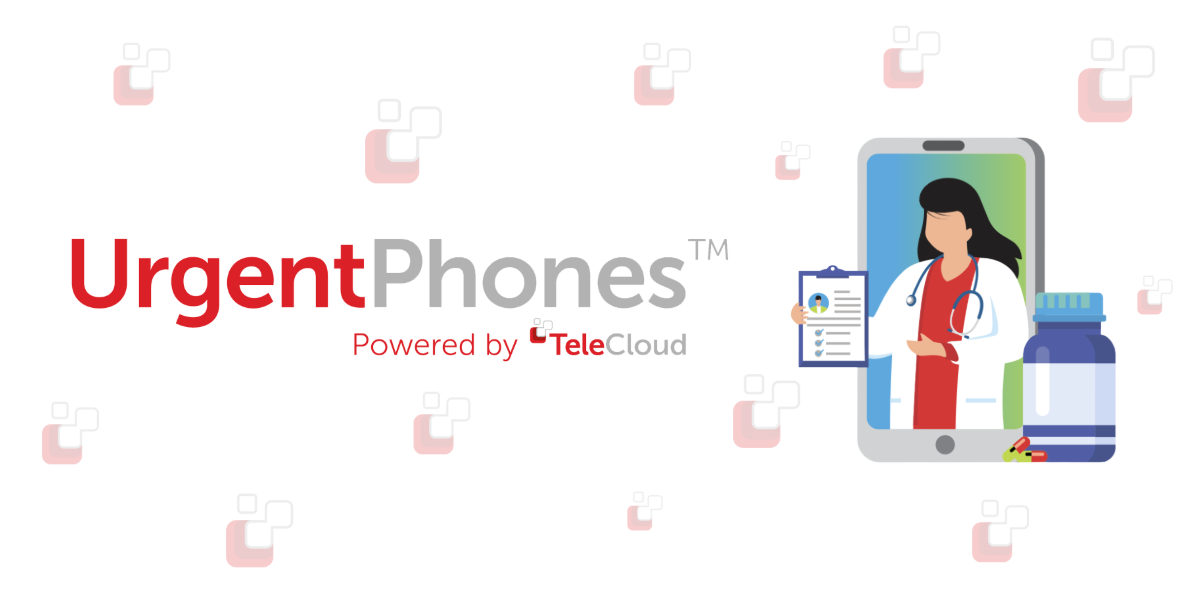How Cloud Communications Benefit Remote Work for Healthcare
May 18th, 2023
5 min read

With the rise of telehealth and remote work, it's becoming increasingly important for healthcare providers to access reliable and effective communication tools. When providing the best possible care, communicating quickly and securely is critical - especially when patients and employees are in different locations.
That's why healthcare providers must use reliable telecommunication technologies that make it easy and seamless for doctors and patients to talk to each other.
A recent study found that 75% of patients prefer virtual healthcare appointments over in-person visits. With this in mind, communicating quickly and securely is paramount in delivering top-notch care, mainly when patients are in different parts of the world. Therefore, healthcare providers must prioritize adopting practical communication tools to ensure patient satisfaction and positive health outcomes.
So, whether you're a healthcare professional or just interested in the latest tech trends, read on to learn more about how cloud communications can improve healthcare for everyone involved.
Advantages of Cloud Communications for Remote Work in Healthcare
Let's dive into the advantages of cloud communications for the remote work of medical and administrative staff in healthcare organizations.
Scalability and flexibility
One of the primary advantages of cloud communications for remote work in healthcare organizations is their scalability and flexibility. With cloud-based solutions, healthcare organizations can easily adjust their communication needs based on the number of staff and patients they need to serve during a specific day of the week:
-
When a healthcare organization needs to scale up its communication tools during a busy season or respond to a sudden surge in patient demand, it can quickly and easily add new users and devices to its cloud-based platform. This means they can respond to changes in demand without needing expensive on-premise hardware or infrastructure.
-
Suppose a healthcare organization needs to scale down its communication tools during a slow season or respond to decreased patient demand. In that case, it can quickly reduce its usage of cloud-based services and only pay for what they need. This makes cloud communications a flexible and cost-effective solution.
Cloud communications can be accessed from any device with an internet connection. Healthcare providers can use their own or personal devices to access communication tools while working remotely securely. This flexibility allows for a more mobile and distributed workforce, which can help healthcare organizations better serve patients in different locations and time zones.
Healthcare organizations that switch to modern communication platforms see a 22% reduction in patient wait times and a 19% increase in team member productivity.
Cost Effectiveness
Traditional communication tools can be expensive and slow, especially when factoring in often complex hardware, installation, and associated maintenance costs. With cloud-based solutions, you only need an internet connection and a device. This eliminates the need for expensive on-premise equipment and saves healthcare organizations money, now and in the long run.
- According to a study by the International Data Corporation (IDC), businesses that switch to cloud-based communications solutions can save an average of 30% on their communication costs. The study also found that cloud-based communications solutions can provide a 42% return on investment (ROI) over five years.
- In the healthcare industry specifically, a study by Markets and Markets found that the global healthcare cloud computing market is expected to grow at a compound annual growth rate (CAGR) of 17.2% between 2020 and 2025.
This offers significant savings for healthcare organizations by eliminating the need for expensive hardware and maintenance costs, offering a subscription-based pricing model, and providing a more efficient and secure communication platform.
Increased Collaboration and Communication Among Staff
With cloud-based solutions, healthcare providers can easily collaborate, avoid scheduling challenges, and communicate faster and more effectively than traditional communication tools. This can help improve the quality of care and patient outcomes by using:
- Real-time messaging: Cloud-based solutions such as instant messaging enable healthcare providers to communicate and share information in real time. This feature allows providers to collaborate quickly and efficiently, leading to faster decision-making and improved patient outcomes.
- File sharing: Sharing files such as patient records, test results, and medical images can be a time-consuming process, especially when using traditional communication methods. Cloud-based file sharing simplifies this process, enabling healthcare providers to access and share files quickly and securely.
- Video conferencing: Video conferencing tools are essential in remote work setups, especially in healthcare organizations where face-to-face interactions are crucial. Healthcare providers can use video conferencing to communicate with patients, conduct remote consultations, and collaborate with other healthcare professionals.
Cloud-based solutions allow healthcare providers to access patient records and medical information from any location or device. This feature ensures that providers can access the information they need to make informed decisions, resulting in better patient outcomes.
Enhanced Security and Compliance
Healthcare organizations are subject to strict regulations such as HIPAA (Health Insurance Portability and Accountability Act), requiring the protection of patient information and maintaining privacy. Cloud communications can help healthcare organizations meet these requirements by providing a secure and compliant platform for communication and collaboration.
Cloud-based solutions typically offer robust security features such as encryption, firewalls, and access controls that can help prevent unauthorized access and protect sensitive information. Cloud providers often have dedicated compliance teams that monitor regulatory changes and ensure their platforms are current with the latest standards. Furthermore, cloud communications can offer additional security benefits for remote work.
- For example, with cloud-based solutions, healthcare providers can access patient information and collaborate securely from any location or device. This means they can work from home or on the go without compromising patient privacy or security.
- According to a recent survey, 83% of healthcare providers now use cloud-based technology to securely access patient information and collaborate from any location or device.
Cloud communications provide healthcare organizations with numerous benefits, such as improved security and compliance features essential for meeting regulatory requirements and safeguarding patient data. These measures are particularly crucial in remote work settings, where healthcare providers may need to access patient information from various devices and locations.
A Better Patient Experience
One of the most significant benefits of cloud communications for healthcare organizations is the potential for a better patient experience. Here are some ways in which cloud communications can improve patient care:
- Remote consultations: With cloud communications, healthcare providers can offer remote consultations, which can be especially beneficial for patients who have difficulty traveling to healthcare facilities. This can save time and money for patients and improve access to healthcare services.
- Timely communication: Cloud communications enable healthcare providers to communicate with patients in real time, which can help to improve patient outcomes. Patients can receive timely updates on their treatment plans, test results, and medication reminders.
- Access to specialists: With cloud communications, healthcare providers can easily connect with specialists and other healthcare professionals who may not be physically located in the same area. This can help ensure patients receive the best care regardless of location.
- Patient portals: Cloud-based patient portals allow patients to access their medical records, schedule appointments, and communicate with their healthcare providers from anywhere, at any time. This can help to improve patient engagement and satisfaction.
Legacy phone systems are often outdated, lack functionality, fail to meet business needs, and are no longer cost-efficient.
The impact of cloud communications on the patient experience cannot be overstated. It is a game-changer for individuals residing in areas with limited access to healthcare services. These individuals face significant challenges in obtaining the necessary care, and this advancement is a substantial aid to them.
Ready to Improve Your Healthcare Communications?
The benefit of cloud communications is that it provides a simple and cost-effective solution for healthcare organizations to improve their communication, collaboration, and patient care.
Cloud communications make it easier for healthcare providers to stay connected and collaborate effectively, even when they're working remotely. This improves their ability to work together and respond quickly to patient's needs, resulting in better patient outcomes.
In addition, cloud communications can help healthcare organizations save money in the long run by eliminating the need for expensive hardware and maintenance costs. Plus, it can improve the security and compliance of their communication and collaboration processes, which is essential in the healthcare industry.
If you're a healthcare organization looking to improve your communication and collaboration processes, consider exploring cloud communications solutions like TeleCloud. They offer a range of cloud-based solutions to help you achieve your goals and provide better patient care.
vin@telecloud.net OR call/text 908-378-1218
Topics:















